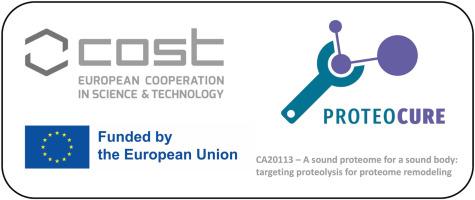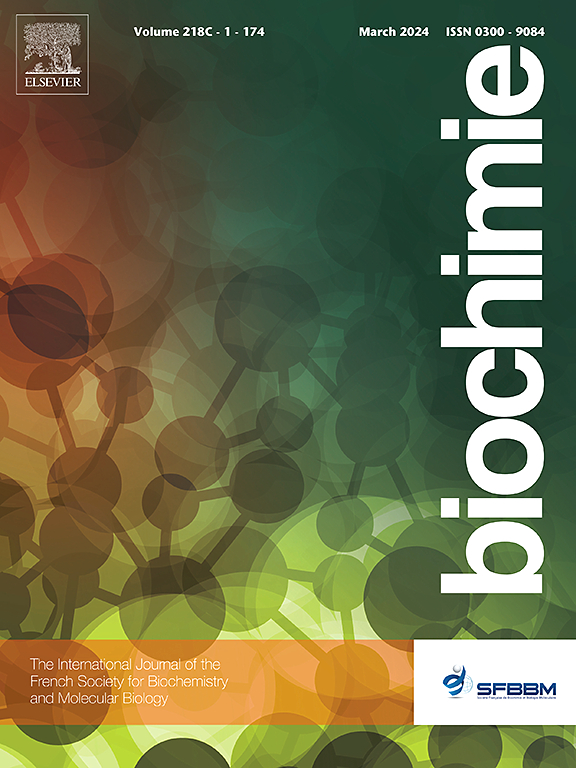ProteoCure: A European network to fine-tune the proteome
IF 3
3区 生物学
Q2 BIOCHEMISTRY & MOLECULAR BIOLOGY
引用次数: 0
Abstract
Proteins are essential molecular actors in every cellular process. From their synthesis to their degradation, they are subject to continuous quality control mechanisms to ensure that they fulfil cellular needs in proper and timely fashion.
Proteostasis is a key process allowing cells or organisms to maintain an appropriate but dynamic equilibrium of their proteome (the ensemble of all their proteins). It relies on multiple mechanisms that together control the level, fate and function of individual proteins, and ensure elimination of abnormal ones. The proteostasis network is essential for development and adaptation to environmental changes or challenges. Its dysfunctions can lead to accumulation of deleterious proteins or, conversely, to excessive degradation of beneficial ones, and are implicated in many diseases such as cancers, neurodegeneration, or developmental and aging disorders. Manipulating this network to control abundance of selected target proteins is therefore a strategy with enormous therapeutic or biotechnological potential.
The ProteoCure COST Action gathers more than 350 researchers and their teams (31 countries represented) from the academic, clinical, and industrial sectors, who share the conviction that our understanding of proteostasis is mature enough to develop novel and highly specific therapies based on selective tuning of protein levels. Towards this objective, the Action organizes community-building activities to foster synergies among its participants and reinforce training of the next generation of European researchers. Its ambition is to function as a knowledge-based network and a creative exchange hub on normal and pathologic proteostasis, focusing on developing innovative tools modulating the level of specific protein(s).

ProteoCure:欧洲蛋白质组微调网络。
蛋白质是每个细胞过程中必不可少的分子角色。从合成到降解,它们都要接受持续的质量控制机制,以确保它们能适当、及时地满足细胞的需要。蛋白质稳态是细胞或生物体维持其蛋白质组(所有蛋白质的集合体)适当但动态平衡的关键过程。它依靠多种机制共同控制单个蛋白质的水平、命运和功能,并确保消除异常蛋白质。蛋白稳态网络对于发育和适应环境变化或挑战至关重要。它的功能失调会导致有害蛋白质的积累,或者相反,导致有益蛋白质的过度降解,并与癌症、神经变性、发育和衰老障碍等许多疾病有关。因此,操纵这一网络来控制选定目标蛋白质的丰度是一种具有巨大治疗或生物技术潜力的策略。ProteoCure COST 行动汇聚了来自学术界、临床界和工业界的 350 多名研究人员及其团队(31 个国家),他们都坚信,我们对蛋白稳态的认识已经足够成熟,可以在选择性调节蛋白质水平的基础上开发出新型和高度特异性疗法。为实现这一目标,该行动组织了社区建设活动,以促进参与者之间的协同作用,并加强对下一代欧洲研究人员的培训。该行动的目标是成为一个以知识为基础的网络,以及正常和病理蛋白稳态的创造性交流中心,重点开发调节特定蛋白质水平的创新工具。
本文章由计算机程序翻译,如有差异,请以英文原文为准。
求助全文
约1分钟内获得全文
求助全文
来源期刊

Biochimie
生物-生化与分子生物学
CiteScore
7.20
自引率
2.60%
发文量
219
审稿时长
40 days
期刊介绍:
Biochimie publishes original research articles, short communications, review articles, graphical reviews, mini-reviews, and hypotheses in the broad areas of biology, including biochemistry, enzymology, molecular and cell biology, metabolic regulation, genetics, immunology, microbiology, structural biology, genomics, proteomics, and molecular mechanisms of disease. Biochimie publishes exclusively in English.
Articles are subject to peer review, and must satisfy the requirements of originality, high scientific integrity and general interest to a broad range of readers. Submissions that are judged to be of sound scientific and technical quality but do not fully satisfy the requirements for publication in Biochimie may benefit from a transfer service to a more suitable journal within the same subject area.
 求助内容:
求助内容: 应助结果提醒方式:
应助结果提醒方式:


